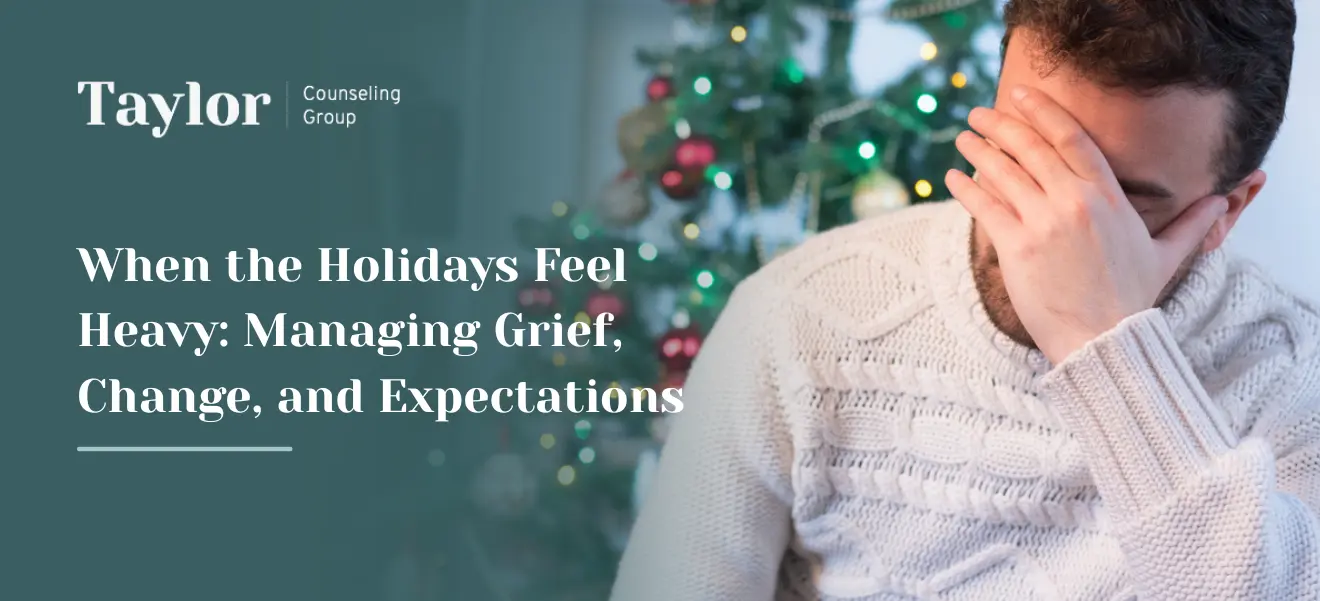When you go through a devastating loss or trauma, it can feel like the ground has been pulled out from under you. You might wonder if you’ll ever feel like yourself again.
Studies show that 5-10% of grieving young people develop depression, post-traumatic stress disorder (PTSD), or prolonged grief disorder. But you don’t have to go through this alone. Grief counseling can help you process these complex emotions, untangle the confusion, and take steps toward healing.
At Taylor Counseling Group, our therapists provide compassionate, personalized care to help you navigate grief at your own pace. Let’s explore how our grief counseling services can support you on your way forward.
What is Grief Counseling?
Grief counseling is a type of professional therapy designed to help you work through the emotional impact of loss.
Grief looks different for everyone. People commonly refer to the familiar stages of grief, initially coined in 1969 by psychiatrist Elisabeth Kubler-Ross. They are:
- Denial
- Anger
- Bargaining
- Depression
- Acceptance
You may go through at least two of the five stages when you’re grieving. But it’s important to remember that there’s no set order, and not everyone experiences all of them. Your grief may show up in different ways, including:
- Shock or disbelief
- Anxiety or overwhelming distress
- Irritability or anger
- Periods of sadness or mood swings
- Loss of sleep or appetite changes
Counseling will help you address some of the reactions as you adjust to your new reality. Some people start to feel more like themselves in as little as six months. But for others more affected, healing can take up to a year or more.
 Grief Counseling for Help when dealing with grief
Grief Counseling for Help when dealing with grief
How Grief Counseling Can Help You Heal
The thing about grief is that you can’t go around it, under it, or over it—you have to go through it. And that’s the hardest part. Grief counseling arms you with the tools to cope with these intense emotions.
Providing a Safe Space for Expression
After a loss, a lot of people feel like they have to “stay strong”—like showing their pain means they’re falling apart. Maybe they don’t want to burden others, or they feel like they need to be the rock for their family.
But bottling up grief only makes it heavier to carry. Over time, that weight can turn into stress, anxiety, or physical exhaustion.
In therapy, you can talk openly about your loss without fear of being judged or misunderstood. You can cry, vent, or simply sit in silence—whatever you need. A therapist will listen with empathy and help you make sense of your emotions.
Developing Coping Strategies
Counseling can offer a toolkit of grief therapy techniques and coping strategies, such as:
Journaling
Writing down your thoughts and feelings lets you process them on a deeper level. According to research, journaling can ease stress, anxiety, and depression — emotions that often come with loss.
Deep Breathing
Breathing techniques can help calm your mind and body. You’ll learn simple but effective ways to steady your emotions and regain a sense of balance.
Mindfulness
Mindful meditation encourages you to let go of past regrets and future worries. It helps you sit with your emotions without becoming consumed by them.
Addressing Complicated Grief
For some, grief lingers longer and feels more intense. If you’ve been stuck in deep sadness for months or years, you may be experiencing complicated grief—a prolonged form of mourning.
The intensity of grief can vary from person to person, depending on the nature of the loss. But the symptoms you feel may be severe. Complicated grief may make it hard to get through your daily routine and function properly.
Signs of complicated grief include:
- A persistent sadness that doesn’t seem to fade.
- A deep longing that makes it hard to focus on the present.
- Struggling to think about your loved one without overwhelming pain.
- Steering clear of places, people, or conversations that bring back memories.
- Feeling like you’ve lost a part of yourself along with them.
- Withdrawing from loved ones.
Therapists can help identify these patterns and provide specialized strategies to help you get better.
Building a Support System
Grief is isolating. Even when you’re surrounded by family and friends, you might still feel alone in your pain. Sometimes, people don’t know how to support you, or they assume you’re “doing fine” when you’re struggling.
Counseling can help you rebuild connections and find the right support system. A therapist can guide you in opening up to loved ones, joining a grief support group, or connecting with a community that truly understands your loss. Over time, you’ll find comfort in shared memories, moments of understanding, and maybe some laughs.
Encouraging Self-Compassion and Care
When you’re struggling with loss, basic self-care often falls by the wayside. You might forget to eat, have trouble sleeping, or feel too drained to do things you once enjoyed.
Therapy can help you recognize when you’re neglecting your well-being and remind you to prioritize your needs.
Grief counseling also teaches self-compassion—learning to be patient with yourself instead of feeling like you should “be over it” by now. A therapist can help you challenge negative self-talk and set realistic expectations for your healing process.
Helping with Transition and Adjustments
One of the hardest parts of grief is figuring out how to move forward. You don’t want to forget your loved one, but you also don’t want to feel stuck in pain forever. Many people struggle with this balance.
Grief counseling helps you find a way to honor your loss while still living your life. It could mean carrying on a tradition, creating something meaningful, or finding a new sense of purpose. Your loved one will always be part of you, but that doesn’t mean you have to stop living.
Contact Taylor Counseling Group for Compassionate Grief Counseling Services
Losing someone you love is one of the hardest things you’ll ever go through. Some days, you might feel numb, while other days, the pain might hit you out of nowhere. It’s a rollercoaster that no one is truly prepared for.
Grief counseling exists to help people healthily process loss. At Taylor Counseling Group, we offer affordable, personalized support to help you navigate the waves of grief. Our therapists understand what you’re going through and use different approaches to support you during this difficult time.
With locations in Dallas-Fort Worth, San Antonio, Austin, Houston, and Waco we provide reliable and confidential counseling services across Texas.






